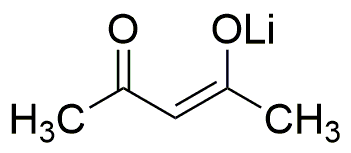(2,4-Pentanedionato)lithium is widely utilized in research focused on:
- Battery Technology: This compound serves as a precursor in the synthesis of lithium-based battery materials, enhancing energy density and overall performance in rechargeable batteries.
- Catalysis: It acts as a catalyst in various organic reactions, improving reaction rates and yields, particularly in the production of fine chemicals and pharmaceuticals.
- Material Science: Used in the development of advanced materials, it contributes to the creation of high-performance polymers and composites with improved thermal and mechanical properties.
- Electronics: This compound is integral in the formulation of conductive inks and coatings, which are essential for printed electronics and flexible circuit applications.
- Research and Development: It is a valuable reagent in laboratories for synthesizing other lithium compounds, facilitating studies in coordination chemistry and materials science.
General Information
Properties
Safety and Regulations
Applications
(2,4-Pentanedionato)lithium is widely utilized in research focused on:
- Battery Technology: This compound serves as a precursor in the synthesis of lithium-based battery materials, enhancing energy density and overall performance in rechargeable batteries.
- Catalysis: It acts as a catalyst in various organic reactions, improving reaction rates and yields, particularly in the production of fine chemicals and pharmaceuticals.
- Material Science: Used in the development of advanced materials, it contributes to the creation of high-performance polymers and composites with improved thermal and mechanical properties.
- Electronics: This compound is integral in the formulation of conductive inks and coatings, which are essential for printed electronics and flexible circuit applications.
- Research and Development: It is a valuable reagent in laboratories for synthesizing other lithium compounds, facilitating studies in coordination chemistry and materials science.
Documents
Safety Data Sheets (SDS)
The SDS provides comprehensive safety information on handling, storage, and disposal of the product.
Product Specification (PS)
The PS provides a comprehensive breakdown of the product’s properties, including chemical composition, physical state, purity, and storage requirements. It also details acceptable quality ranges and the product's intended applications.
Certificates of Analysis (COA)
Search for Certificates of Analysis (COA) by entering the products Lot Number. Lot and Batch Numbers can be found on a product’s label following the words ‘Lot’ or ‘Batch’.
Número de catálogo
Número de lote/lote
Certificates Of Origin (COO)
This COO confirms the country where the product was manufactured, and also details the materials and components used in it and whether it is derived from natural, synthetic, or other specific sources. This certificate may be required for customs, trade, and regulatory compliance.
Número de catálogo
Número de lote/lote
Safety Data Sheets (SDS)
The SDS provides comprehensive safety information on handling, storage, and disposal of the product.
DownloadProduct Specification (PS)
The PS provides a comprehensive breakdown of the product’s properties, including chemical composition, physical state, purity, and storage requirements. It also details acceptable quality ranges and the product's intended applications.
DownloadCertificates of Analysis (COA)
Search for Certificates of Analysis (COA) by entering the products Lot Number. Lot and Batch Numbers can be found on a product’s label following the words ‘Lot’ or ‘Batch’.
Número de catálogo
Número de lote/lote
Certificates Of Origin (COO)
This COO confirms the country where the product was manufactured, and also details the materials and components used in it and whether it is derived from natural, synthetic, or other specific sources. This certificate may be required for customs, trade, and regulatory compliance.

